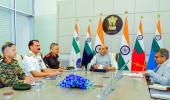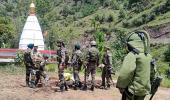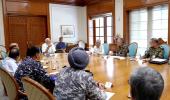'India for its survival has to change its doctrine from no first use to a pre-emptive attack in case of any hostile move by Pakistan,' recommends Colonel Anil A Athale (retd).

President Trump spoke on Monday about India and Pakistan having dinner together.
To many thoughtful Indians, it is equivalent of accepting a dinner invite from cannibals and living to tell the tale!
The ongoing Operation Sindoor, undertaken to punish Pakistan for its sponsorship of terrorism in India, has evoked criticism from two extremes.
Adherents of peace-at-any cost argue that India is playing with fire and a cornered Pakistan could resort to the use of nuclear weapons, leading to a catastrophe.
On the other hand, supporters of the government feel that this was the right opportunity to 'finish' Pakistan and we missed an opportunity like Prithviraj Chauhan did after the Battle of Tarain in 1191 AD.
Despite defeating Mohammad Ghori, Prithviraj let him escape only for Ghori to return and defeat him.

The right answer to criticism from both these extremes needs a careful look at the India-Pakistan nuclear calculus.
We also have to accept that everyone loves a (weak) Pakistan. China supports Pakistan as a proxy to check India, the US has long term ties with Pakistan's military elite and nurtures the belief that it can still 'use' Pakistan, the Islamic world supports it since it is the only Islamic nation with nuclear weapons.
These geopolitical factors are enduring in nature and any attempt by India to 'finish' Pakistan will meet combined resistance from all these quarters.
Once a country acquires nuclear weapons, it is virtually immortal. It can implode internally like the erstwhile Soviet Union but cannot be defeated militarily.
The global danger that the use of nukes pose in terms of radioactive fallout, the threat of nuclear winter, all contribute to this. Pakistan's Achilles Heel, like the USSR, is not military, but economic weakness.
Nuclear weapons are weapons that preserve and protect the status quo. The problem arises when a country like Pakistan treats its nuclear weapons like a shield to carry out operations to change the status quo like in the case of Kashmir for starters and Gazwa E Hind in phase two.

Operation Sindoor was launched to remind Pakistan of this cardinal truth. Pakistan has banked on the earlier Indian policy of restraint based on the realisation that between nuclear neighbours there is no alternative to peace.
But Pakistan needed a reminder that in this equation there is no room for adventurism via the use of terrorism. This is the clearest signal India has given to Pakistan.
There is no doubt that India took a grave risk in attacking terror bases in Pakistan's heartland of Punjab.
The world and the region dodged the nuclear bullet twice this century. First, in December 2001 after terrorists attacked Parliament.
It was the bravery and presence of mind of the sentries posted at Parliament plus luck that a nuclear war was avoided.
Imagine the situation had the terrorists entered Parliament and killed dozens of MPs. Would India have stopped from attacking Pakistan, ultimately leading to a nuclear war?
Second, in November 2008 when terrorists attacked Mumbai.
The point that I wish to make is that by NOT reacting forcefully to a major terrorist outrage, we encouraged the terrorists and Pakistan to cross the level of Indian tolerance.
By drawing red lines and acting against the supporters of terror, Operation Sindoor has raised the costs and to that extent reduced the chances of a nuclear war taking place as escalation due to a terror attack.

In the ultimate analysis the elephant in the room is the radicalisation of the Pakistani polity that has taken place since Zia-ul Haq's 1979 policy of Islamisation.
The India-Pakistan dispute is no longer a territorial dispute between two countries. General Syed Asif Munir, Pakistan's army chief, has made it an ideological fight between Islam and Hinduism.
Territorial conflict leave a scope for compromise and peace, but ideological conflict leads to hardening of positions and total war that could well go nuclear. Many western observers fail to understand this distinction.
Operation Sindoor also highlighted the vulnerability of Pakistan's nuclear weapon delivery system.
In any case Pakistan's strategy of First Use was a policy of 'nuclear suicide' since it did not have the ability to neutralise even a small portion of India's nuclear capability.
With a demonstrated ability to hit Pakistani air power, the only option left for Pakistan is to launch a surprise nuclear attack given the ideological nature of its enmity with India.
India for its survival and defence has to change its doctrine from no first use to a pre-emptive attack in case of any hostile move by Pakistan.
Operation Sindoor marks the beginning of both countries resorting to 'hair trigger' deployment in the immediate future.
In a historical sense we seem to revert to the tense 1960s between the USA and USSR. Luckily for the world those two countries were geographically far apart and each had 10 to 15 minutes of reaction time.
In the case of neighbours like India and Pakistan the reaction time is less than 5 minutes.
The world is entering a dangerous era.
Colonel Anil A Athale (retd) is a military historian specialising in insurgency. He is the author of Nuclear Menace the Satyagraha Approach/em published in 1997. His earlier columns can be read here.
Feature Presentation: Rajesh Alva/Rediff










